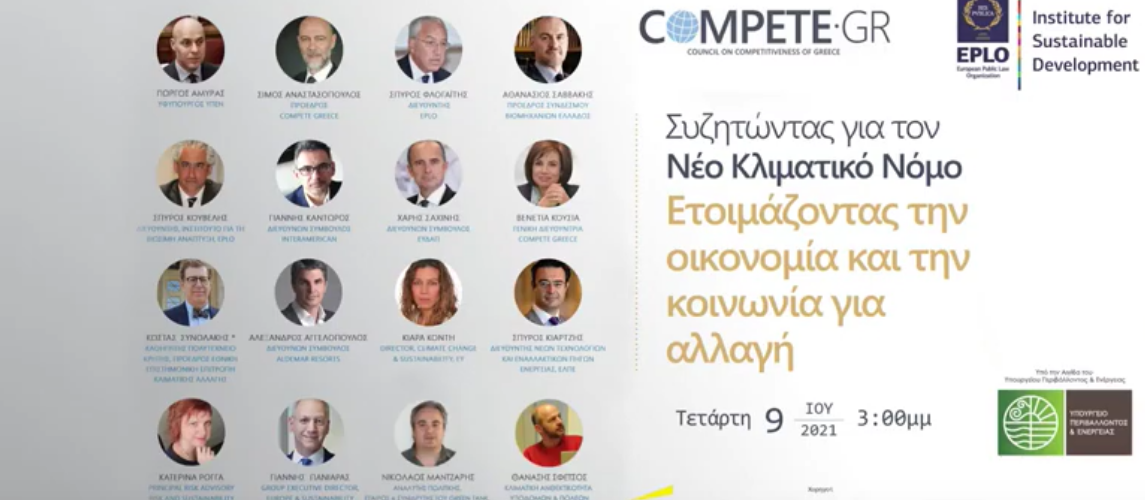Nikos Mantzaris participated in the online event entitled “Climate Law: Preparing the Economy and Society for Change” co-organized by the Institute for Sustainable Development of the European Public Law Organization (EPLO) and the Competitiveness Council of Greece (COMPETE · GR) on Wednesday, 9 June.
The event, aimed at the exchange of views between the institutions and the business and academic community, was held under the auspices of the Ministry of Environment and Energy and was addressed by the Deputy Minister George Amyras.
The first panel entitled “What institutional framework does Greece need to tackle Climate Change?” focused on specific proposals for the content of the Law that is currently being drafted. Nikos Mantzaris, the Energy and Climate Policy Officer of WWF Greece Dimitris Ibrahim, the President of the Council for Sustainable Development (CSD) of the Hellenic Federation of Enterprises (SEV) Giannis Paniaras, and the President of the Federation of Industries of Greece (SBE) Athanasios Savvakis, participated in the panel discussion.
In his presentation, Nikos Mantzaris first referred to the recent developments around the formulation of the national climate law in Greece and the framework in which the Scientific Committee for Climate Change and the Legislative Drafting Committee, in which he is a member, are currently working towards the development of the national climate law. He then presented and analyzed his own views on the targets that should be included in Greece’s climate law. Specifically, he proposed both a long-term climate target for 2050 as well as intermediate targets for 2030 and 2040. He further explained why it is necessary to establish five-year sectoral carbon budgets for six sectors of the economy (electricity & heating, industry, transport, buildings, agriculture & livestock and waste management). Finally, he expressed the view that the national climate law should include specific commitments to curb the root cause of climate change, namely the use of fossil fuels. In particular, he proposed to end the concession of any new areas for hydrocarbon exploitation, the suspension of the extension for existing contracts after their expiration date, as well as the establishment of 2025 as the date of complete de-lignitization, in accordance, also with the recent announcements by the Public Power Corporation (PPC).
You can watch Nikos Mantzaris’ talk:
The second panel, entitled “Adapting the Economy and Society to Climate Change: Can Legislation Help Get Ready?“, focused on the huge issue of climate change adaption for the economy and the society and explored whether the new institutional framework can and must function as the basis for the development of national legislation on a number of issues that will surely concern Greek society and the economy as a result of climate change in the coming decades. This panel included Alexandros Angelopoulos, CEO, Aldemar Resorts Group, Giannis Kantoros, CEO, INTERAMERICAN Group, Spyros Kiartzis, Director of New Technologies and Alternative Energy Sources of the Hellenic Petroleum Group. Alexandros Papageorgiou, Chemist, Biosolids Waste Production & Management Manager, Biosolids SA and Katerina Roga, Principal, Risk Advisory, Deloitte.
You can watch the entire event:



















































































































































































































































































































